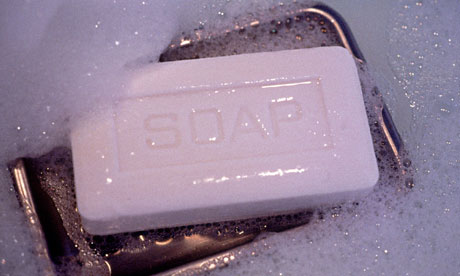
If you are reading this article over breakfast, the chances are you have recently stepped into the shower, lathered up your hair and torso, rinsed off, towelled and blow-dried, before dousing your armpits with deodorant, and wafting on a fog of perfume or aftershave.
Then again, maybe not. The New York Times has just reported on a new trend towards what's sometimes known as soap-dodging. Among those who have cut down on daily showers, baths or hair-washing were a woman who swipes a sliced lemon under her armpits instead of deodorant, another who uses baby wipes to freshen up after her lunchtime runs, and a salesman who shampoos only once a month and gave up anti-perspirant for three years.
Think this is only happening in the US? Think again. There are plenty of signs that this carefree attitude to cleanliness is popular in the UK too – and in some cases growing. Last year, a poll for tissue manufacturer SCA found that 41% of British men and 33% of women don't shower every day, with 12% of people only having a proper wash once or twice a week. (These figures place us behind Australia, Mexico and France in the personal hygiene stakes.) Around the same time, research by Mintel found that more than half of British teenagers don't wash every day – with many opting for a quick spray of deodorant to mask any stink.
Over the last few years there have been regular suggestions that daily hair-washing, or even any hair-washing at all, is quite unnecessary, with the commentator Matthew Parris admitting he hadn't shampooed his hair for a decade, and broadcaster Andrew Marr reporting himself perfectly happy with the results when he followed suit for a short while. Many people clearly agree that a regular hair-wash is a hassle. In 2008, Boots reported a 45% rise in sales of dry shampoo ( a product that can be sprayed on hair between showers), while the Batiste brand has recently seen its sales double.
There are, of course, environmental benefits. In a bid to reduce his carbon footprint to the absolute minimum, environmentalist Donnachadh McCarthy, 51, limits his showers to about twice a week. "The rest of the time I have a sink wash," he says. "I believe that I'm as clean as everyone else." It has helped him to get his water consumption down to around 20 litres a day – well below the 100 to 150 average in the UK.
As McCarthy points out, it's only recently that we have expected people to bathe or shower every day. "When I was a kid," he says, "the normal thing was to bathe once a week." Head much further back into history, and we find Elizabeth I bathing once a month, and James I apparently only ever washing his fingers. In 1951, almost two-fifths of UK homes were without a bath, and in 1965, only half of British women wore deodorant.
Now we have begun to fetishise extreme cleanliness, to create the kind of culture where, as McCarthy says, it's not entirely unusual for people staying in hotels to churn through 1,000 litres of water a day – showering in the morning, after a sauna, after the swimming pool, before dinner, before bed. The international market for soaps of all kinds is now $24bn a year. And some dermatologists fear that this intense, regular washing is stripping our skin of germs that could actually be beneficial to us, that help our skin stay healthy, balanced and fresh.
It might be worth us all occasionally missing a shower or two, then, so long as we don't throw out the baby with the bathwater. While being environmentally friendly is good, smelling like a bin is not.

